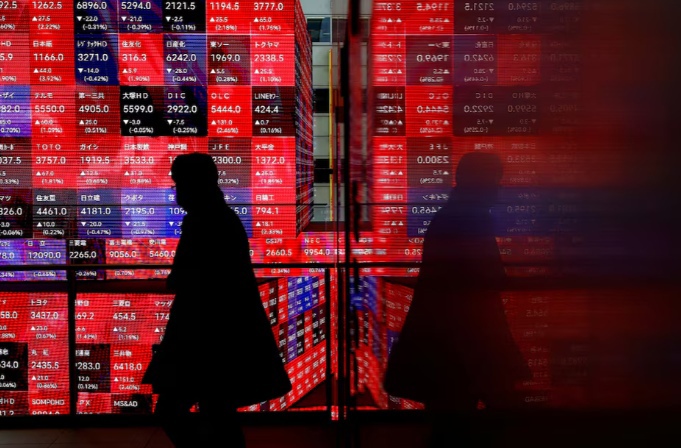A wave of panic swept through financial markets on Monday, with stocks falling sharply in the US and around the world as investors took note of signs of a slowing US economy.
Monday’s fall extended a sell-off that began last week after the US jobs report on Friday showed a significant slowdown in hiring and unemployment rose to the highest level in nearly three years. That fuelled fears that the world’s largest economy could slip into recession and that the Federal Reserve may have waited too long to cut interest rates.
Other factors exacerbated the fall – fears that technology stocks had risen too quickly and that a sudden strengthening of the yen would hurt the prospects of Japanese companies and some global traders – both of which also hit markets.
The S&P 500 index fell 3.7 per cent in early trading. The technology-heavy Nasdaq composite index fell 4.7 per cent. “The markets are a little out of control,” Andrew Brenner, head of international fixed income at National Alliance Securities said. He also added:
It’s just total panic. It’s not real, but it’s painful, and it could stay with us for a few weeks.
Taiwan stocks fell more than 8 per cent on Monday, with the Taiex, the Taiwan Stock Exchange’s weighted index, ending morning trading at 19,830.88 points. The collapse sent shares of chip giant TSMC, which produces more than half of the world’s silicon wafers, down 9.3 per cent.
Indian stock markets, the Sensex and Nifty 50, suffered a heavy sell-off early Monday, down more than 3 per cent each in intra-day trading. Analysts blamed fears of recession in the US and rising tensions in the Middle East.
Japan’s Nikkei index fell 13 per cent in early trading on Monday, hitting seven-month lows. Investors say the index has not seen such losses since the global financial crisis of 2011.
The pan-European STOXX index fell about 3 per cent, with declines in all of the continent’s major markets.
According to the CME’s FedWatch tool, traders now estimate the probability that the US central bank will cut interest rates by 50 basis points in September at 89.5 per cent, up from an 11 per cent probability last week.
Brokerages have also revised their 2024 Fed Funds rate forecasts to a more aggressive cut. JPMorgan believes the Fed will cut the rate by 50 basis points at the September and November meetings and then cut the rate by 25 basis points at each subsequent meeting. Goldman Sachs expects three consecutive 25 basis point cuts in September, November and December. Analysts at Bank of America expect the Fed to start cutting interest rates in September by 25 basis points, although the bank previously expected the first cut only in December.
The price of bitcoin fell below the $50,000 mark for the first time since February this year as the effects of the turmoil in the global stock market spilled over to the cryptocurrency market. The cryptocurrency’s price hit a low of $49,351 in early trading on Monday, and although it had bounced above the $50,000 threshold as of 08:00, it was still down 13 per cent for the day.
The main index of the Borsa Istanbul 100 Index (BIST 100) fell 6.72 per cent during trading, after which the bourse halted trading but has since resumed trading.
Factors behind today’s stock market crash
Dr. VK Vijayakumar, chief investment strategist at Geojit Financial Services, said the US jobs data, which triggered a global sell-off, was the key factor behind today’s sharp fall in the Sensex and Nifty.
He explained that expectations of a soft landing for the US economy are now under threat due to a decline in the number of jobs in July and a sharp rise in the US unemployment rate to 4.3 per cent. Geopolitical tensions in the Middle East are also adding to market concerns, Vijayakumar noted.
Another major factor is the winding down of yen trade, which has significantly affected the Japanese market. The collapse of the Nikkei index by more than 4% this morning signalled a crisis in the Japanese market.
Vijayakumar also noted that valuations in India remain strong, especially in the mid and small-cap segments, driven mainly by sustained liquidity inflows. Overvalued sectors such as defence and railways are expected to face pressure. He advised investors not to rush into buying during this correction and wait for the market to stabilise.
Amid the ongoing sell-off, Sameet Chavan, Head of Research, Technical and Derivatives at Angel One, emphasised the importance of remaining vigilant and monitoring global developments. He advised to scrutinise these trends over the weekend to be well prepared to respond effectively.
Meanwhile, Tanvi Kanchan, head of business and strategy in the UAE at Anand Rathi Shares and Stock Brokers, said:
Broad indices traded in negative territory, echoing global indices after the Nasdaq and S&P lost 3.2 per cent in two trading days following the Federal Reserve’s decision to keep interest rates on hold. Asian stocks fell amid a slowdown in the US economy, a prolonged decline in Japanese stock markets and rising tensions in the Middle East. This sell-off is more of a short-term volatility driven by profit taking and is not indicative of a long-term panic mode set in Indian equities. Investors looking to enter the equity market may consider a phased entry during the volatile period.
